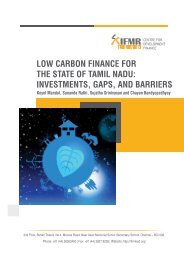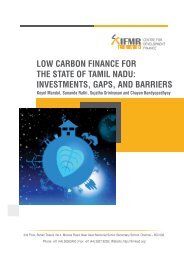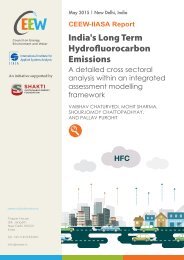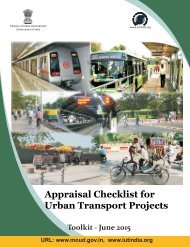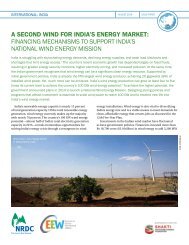Enhancing India’s Readiness to Climate Finance
India has taken several steps to improve its national response to climate change. India’s climate finance requirements, however, are very high, and will need to be met through a combination of public, private and international climate finance. See more at: http://shaktifoundation.in/
India has taken several steps to improve its national response to climate change. India’s climate finance requirements, however, are very high, and will need to be met through a combination of public, private and international climate finance. See more at: http://shaktifoundation.in/
- No tags were found...
Create successful ePaper yourself
Turn your PDF publications into a flip-book with our unique Google optimized e-Paper software.
<strong>Enhancing</strong> <strong>India’s</strong> readiness <strong>to</strong> access and deliver international climate finance<br />
7 Recommendations <strong>to</strong> improve <strong>India’s</strong> climate<br />
finance readiness<br />
Chapter 6 explored <strong>India’s</strong> climate finance readiness gaps, and outlined a series of valuable lessons<br />
for India that can be drawn from peer countries like Brazil, China, Indonesia, Mexico and South Africa.<br />
Chapter 7 extends this analysis one step further, detailing a series of recommendations for India <strong>to</strong><br />
improve their institutional coordination, access, and delivery of climate finance. The development of<br />
these recommendations has been an iterative process that draws on insights from many sources,<br />
including:<br />
<br />
<br />
<br />
<br />
Insights from experts on the evolution of climate finance architecture (especially insight in<strong>to</strong><br />
the development of the Green <strong>Climate</strong> Fund).<br />
Stakeholder interviews held in India with Government (e.g. MoEFCC, MoF, BEE, etc.),<br />
members of the Expert Group on Low Carbon Strategies, the private sec<strong>to</strong>r, civil society, and<br />
bilateral donors.<br />
Views expressed by a wider group of stakeholders at a workshop held in May 2014 <strong>to</strong> test the<br />
climate finance readiness framework outlined in Chapter 4.<br />
Lessons from peer developing countries (see Chapter 6), that have been generated through<br />
interviews with climate finance readiness experts, as well as through secondary research by<br />
the project team.<br />
The following section outlines seven recommendations that have been developed through the<br />
stakeholder consultations listed above, providing guidance on the practical actions India needs <strong>to</strong><br />
undertake <strong>to</strong> implement each recommendation. To the greatest extent possible, the recommendations<br />
attempt <strong>to</strong> build on the existing institutional structure for climate finance access and delivery in India,<br />
as well as <strong>to</strong> embed the recommendations within existing plans such as the NAPCC and SAPCCs.<br />
7.1 Recommendations<br />
<strong>Readiness</strong> Gap 1<br />
India does not have a coherent national climate finance strategy, or a central institution with a<br />
mandate <strong>to</strong> coordinate the access and delivery of climate finance in the country.<br />
It is clear from international experience that climate finance access can be improved with a coherent<br />
plan and a coordinated institutional response at the national level. Developing a national strategy and<br />
framework <strong>to</strong> access and allocate climate finance is therefore an urgent requirement for India <strong>to</strong><br />
ensure a coordinated, joined-up effort <strong>to</strong> meet the NAPCC’s multi-billion dollar funding gap.<br />
Recommendation #1<br />
India should designate or create an independent coordinating agency with the mandate <strong>to</strong><br />
strategically plan, access, mobilise, disburse, and track climate finance at the national level.<br />
This agency should be an independent statu<strong>to</strong>ry body with the mandate <strong>to</strong> coordinate an overall<br />
climate finance strategy in India, in line with the NAPCC, SAPCCs, and national development plans.<br />
India has three main options <strong>to</strong> create a national climate finance coordinating agency. The agency<br />
could either be established by a new act of parliament, through executive order on the<br />
recommendation of the PM Council on <strong>Climate</strong> Change, or be launched formally under the<br />
Environment Protection Act of1986. Since parliamentary enactment is a time consuming process in<br />
India, and since there is a strong need for a coherent national climate finance strategy in India,<br />
Ref: Ricardo-AEA/R/ED59216/Final Report<br />
47




